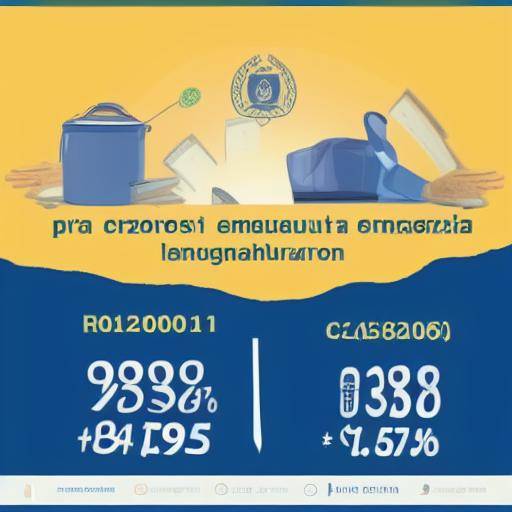
Family budget management is a critical aspect of financial stability. It is essential to strike a balance between income and expenditure to ensure the well-being of all family members. In this article, we will explore practical advice to maintain the family budget with discipline, monitoring and financial success.
Introduction
The family budget is a vital tool for managing financial resources effectively, ensuring that basic needs are met and a comfortable life. Maintaining a family budget requires discipline, constant monitoring and the ability to achieve long-term financial success. In this article we will explore key tips to effectively maintain the family budget, allowing families to take control of their finances and build a solid future.
History and Background
The practice of managing the family budget has existed since time immemorial. Throughout history, families have sought ways to efficiently manage their resources. From bartering in agricultural societies to the use of modern currencies and financial systems, family budget management has continuously evolved to adapt to economic and social changes.
Evolution of Family Budget Management
In ancient times, families depended on self-sufficiency and agriculture to meet their basic needs, requiring careful planning to ensure the availability of food and resources. As advanced societies arose, barter and trading systems influenced how families managed their resources.
In ancient traditions, families used to practice savings techniques, such as storing surplus crops for times of scarcity or exchanging goods with other families to meet specific needs.
In more recent times, the advent of money as a means of exchange completely changed how families managed their finances. Technological advances and globalization have added complexity to the financial landscape, demanding that families be more informed and prepared to adapt to changes.
Current Challenges and Opportunities
Today, families face a wide range of financial challenges, from rising inflation to labour market volatility. However, they also have a number of tools and resources that enable them to manage their finances more effectively than ever. Technology, in particular, has revolutionized how families can monitor and manage their budgets, providing greater transparency and control.
Analysis in Deep
The management of the family budget requires discipline and attention to ensure that the established financial objectives are met. Financial discipline is to control expenditures, avoid unnecessary debts and maintain a balance between income and savings. By adopting disciplined financial habits, families can build a solid foundation for long-term success.
Benefits of Financial Discipline
Financial discipline offers several tangible benefits for families. By maintaining a disciplined approach to budget management, families can reduce financial stress, increase savings and be prepared to face unforeseen circumstances. In addition, financial discipline lays the foundation for sound investment and long-term economic growth.
How does financial discipline influence family welfare?: Financial discipline not only affects economic stability, but also the general well-being of the family, reducing financial-related anxiety and allowing family members to spend time on significant activities.
Challenges and Obstacles to Maintain Financial Discipline
Maintaining financial discipline can be challenging due to several factors:
- Gast tensions: Constant offers and promotions can tempt families to spend more than expected.
- Financial emergencies: Unforeseen situations such as home repairs or medical expenses can destabilize the budget.
- Lack of Financial Education: Not having knowledge about financial management can make planning and savings difficult.
Practical Tips for Maintaining the Family Budget
Here are some practical tips to help families maintain their budget effectively.
1. Establishing Clear Financial Targets
Defining short-term and long-term financial goals is critical to maintaining motivation and focus. These objectives may include saving for a home, paying debts or creating an emergency fund.
2. Create a Detailed Budget
The first step in managing the family budget is to create a detailed budget that includes all income and expenditure. It is important to categorize expenditures and allocate specific amounts to each category.
3. Monitoring and Adjusting Budget Regularly
Reviewing and adjusting the budget monthly allows you to identify deviations and make the necessary adjustments to stay on the right track.
4. Reduced costs
Analyzing expenses and eliminating those who are not essential can free resources to save or invest. This may include unused subscriptions, eating out less often and looking for cheaper alternatives.
5. Fostering Family Participation
Engaging all family members in budget management can create a sense of shared responsibility and commitment to financial objectives.
6. Use Technology to Facilitate Management
Personal finance applications and digital tools can simplify cost tracking and help keep the budget updated in real time.
7. Create an Emergency Fund
Having an emergency fund is crucial to confront unforeseen situations without destabilizing the family budget. It is recommended to save at least three to six months of basic expenses.
8. Planning for the Future
In addition to short-term goals, it is important to plan for the future, including child education and retirement. This ensures long-term financial stability.
Conclusion
Maintaining the family budget is essential for stability and financial well-being. Through discipline, constant monitoring and adoption of healthy financial habits, families can achieve their goals and ensure a solid economic future. By applying these practical tips, families will be better equipped to manage their resources, reduce financial stress and improve their quality of life.
Frequently asked questions
What is a family budget and why is it important?
A family budget is a financial plan detailing the income and expenses of a family. It is important because it helps families control their finances, avoid unnecessary debts and ensure that basic needs are met.
How can I start creating a family budget?
To create a family budget, start by registering all monthly income and expenses. Categorizes expenditures and allocates specific amounts to each category. Check and adjust the budget regularly to keep it updated.
What are the benefits of maintaining a family budget?
Benefits include improved money management, reduction of financial stress, increased savings, emergency preparedness and the ability to achieve long-term financial goals.
What tools can help manage the family budget?
There are many tools available, such as personal finance applications (Mint, YNAB, Personal Capital), computing sheets and software programs that can help track and manage the budget effectively.
How can I involve my family in budget management?
It involves all family members in budget discussions, establishes common financial targets and assigns specific responsibilities to each individual. This creates a sense of shared responsibility and commitment to financial objectives.
In short, maintaining a family budget is a continuing task that requires constant discipline and attention. With appropriate tools and a proactive approach, families can manage their finances effectively, ensuring long-term financial stability and success.






















































